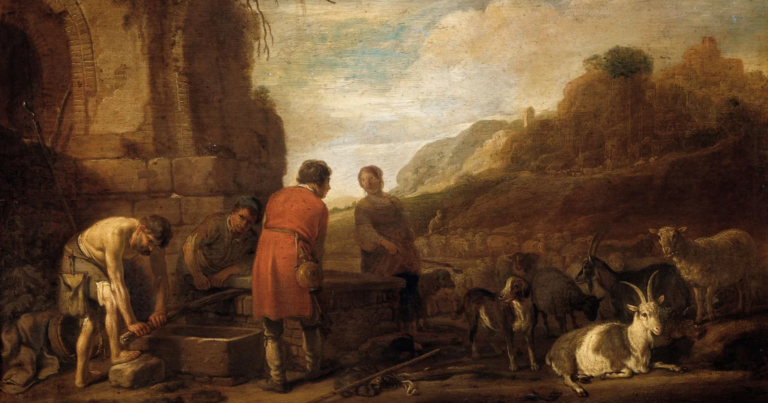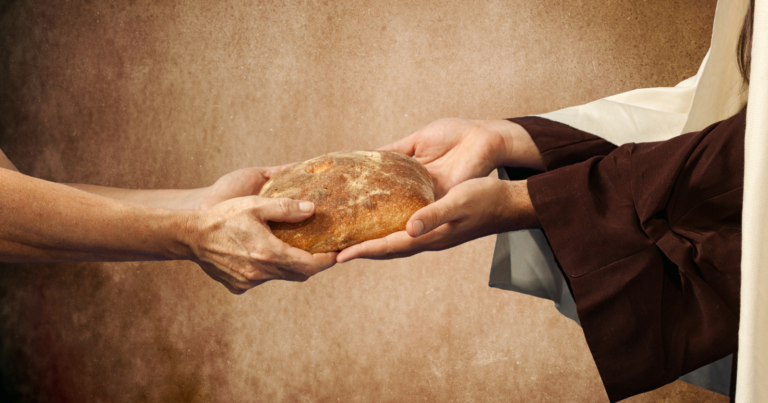Have you ever stumbled upon a piece of poetry that speaks directly to your soul, encapsulating deep spiritual truths in just a few lines?
George Herbert, an English poet and priest, mastered this art.
His poem “The Pulley” offers a profound insight into the human condition and our relationship with God, using the simple metaphor of a pulley to explore themes of blessings and restlessness.
In this article, we delve into Herbert’s spiritual and poetic legacy, exploring how “The Pulley” serves as a mirror to our soul’s journey toward God.
George Herbert: Poet and priest
George Herbert, an English poet with a profound connection to the divine, lived a life that beautifully melded the arts and spirituality.
His journey into poetry was significantly shaped by John Donne, a close friend of his mother and a towering figure in English literature, who also steered Herbert towards a calling in the Church.
Despite his brief life of just 40 years, Herbert’s tenure as a minister was marked by joy and a deep bond with his parishioners who cherished his poetic gift, melodious singing, and musical talent.
Herbert’s work, especially “The Pulley,” resonates deeply with modern believers, offering timeless insights into our relationship with God.
His poetry serves as a bridge, connecting us with the spiritual dilemmas and revelations of his time, which remain relevant today.
Through Herbert’s verses, we’re reminded of the enduring nature of spiritual quest and reflection, enriching our faith journey and encouraging a closer examination of our own relationship with the divine.
‘The Pulley’
When God at first made man,
Having a glass of blessings standing by –
“Let us,” said he, “pour on him all we can;
Let the world’s riches, which dispersed lie,
Contract into a span.”So strength first made a way,
Then beauty flowed, then wisdom, honor, pleasure
When almost all was out, God made a stay,
Perceiving that, alone of all his treasure,
Rest in the bottom lay.“For if I should,” said he,
“Bestow this jewel also on my creature,
He would adore my gifts instead of me,
And rest in nature, not the God of nature:
So both should losers be.“Yet let him keep the rest,
But keep them with repining restlessness;
Let him be rich and weary, that at least,
If goodness lead him not, yet weariness
May toss him to my breast.”
Analyzing ‘The Pulley’
“The Pulley” by George Herbert presents a narrative wherein God, at the creation of man, decides to bestow upon him all the riches of the world, except for one: rest.
This pivotal decision is underscored by the notion that withholding rest would ultimately draw man closer to God.
The poem unfolds in a structured manner, beginning with the act of creation and the distribution of blessings, leading to a deliberate pause where God reserves rest, highlighting its significance.
Herbert’s use of this metaphorical ‘pulley’ reflects the tension between mankind’s endowed gifts and our innate restlessness.
This restlessness, as God foresees, becomes a driving force pushing humanity towards a divine connection.
What does it mean?
Well, it suggests that our unfulfilled desires are not a curse but a path to embrace our reliance on God.
Thus, through this lens, Herbert explores the intricate relationship between human satisfaction and spiritual longing.
Exploring key themes
1) Divine discontent
The theme of divine discontent in “The Pulley” reflects the paradoxical idea that our restlessness can actually be a gift from God.
Herbert illustrates how God deliberately withholds rest from man, despite pouring out other blessings like strength, beauty, wisdom, honor, and pleasure.
However, this intentional act is not a form of punishment but a profound means of grace.
Instead, the absence of rest serves as a constant reminder of our need for something greater than worldly satisfactions.
It suggests that our deepest contentment comes not from external achievements or possessions but from our relationship with the divine.
This divine discontent nudges us towards seeking fulfillment in God, fostering a deeper connection and reliance on Him.
2) The gift of restlessness
Delving deeper into “The Pulley,” George Herbert presents human restlessness not as a curse but as a divine tool designed to lead us back to God.
This state of perpetual seeking, of never being fully satisfied with worldly achievements or pleasures, is depicted as a blessing in disguise.
As Herbert suggests, it’s in our moments of deepest weariness that we find ourselves most open to seeking solace in the divine.
The poem beautifully articulates this concept:
“Let him be rich and weary, that at least, If goodness lead him not, yet weariness May toss him to my breast.”
Here, Herbert captures the essence of human restlessness as a spiritual catalyst. This weariness becomes a divine magnet, pulling us towards God when our own efforts to find rest in earthly blessings fail.
- Restlessness urges us to seek beyond the material.
- Weariness becomes a bridge to divine communion.
Through this lens, Herbert transforms what many would see as a negative state into a positive force for spiritual growth and connection.
3) Seeking beyond satisfaction
While we often equate happiness with the accumulation of blessings and comforts, “The Pulley” invites us to reconsider this notion.
It suggests that true happiness might actually lie in the pursuit rather than in possession.
The poem hints at a deeper form of contentment achieved not through gathering more but by embracing our inherent restlessness as a path to divine connection.
This perspective challenges the conventional wisdom that more is better, proposing instead that it’s our longing that keeps us connected to God.
4) The role of blessings
The poem begins with a powerful image of creation, where God stands with “a glass of blessings standing by,” ready to pour all imaginable riches onto humanity.
Why is this moment pivotal?
Well, it captures the essence of divine generosity and the inception of human existence.
Herbert illustrates a God eager to share the fullness of His treasures, encapsulating strength, beauty, wisdom, honor, and pleasure within the span of human life.
This initial act sets the stage for the poem’s exploration of our relationship with the divine. It reflects a core truth about how we perceive and interact with our blessings.
The imagery Herbert uses – a glass filled to the brim, ready to be poured out – is not just a testament to the abundance of God’s gifts but also a metaphor for the overflowing nature of divine love and care.
In this beginning stanza, Herbert lays down the foundation for understanding the complex dynamics between Creator and creation.
Why withhold rest?
“Yet let him keep the rest, But keep them with repining restlessness; Let him be rich and weary, that at least, If goodness lead him not, yet weariness May toss him to my breast.”
This passage from “The Pulley” encapsulates the essence of God’s wisdom in withholding complete rest from humanity.
George Herbert portrays a divine intentionality behind our innate restlessness.
By ensuring that man remains unsatisfied, God keeps the door open for us to seek Him out as the ultimate source of fulfillment.
This divine strategy is not about depriving us but rather about guiding us toward a deeper realization:
- That we can only find true rest in the divine embrace.
- Our weariness becomes a beacon, leading us back to God’s presence.
In this light, our constant search for peace and fulfillment serves as a reminder of our spiritual journey towards finding rest in the God of nature, rather than in nature itself.
Final reflections on “The Pulley”
All in all, “The Pulley” by George Herbert offers profound insights into the human relationship with God, emphasizing the role of restlessness and blessings in drawing us closer to the divine.
Herbert’s poignant imagery and profound insights remind us that our spiritual journey is intricately designed with a purpose – to lead us closer to God.
As we ponder the timeless message of “The Pulley,” let’s remember:
- Our greatest blessings often come disguised as unfulfilled desires.
- The absence of rest is not a void but a beckoning toward divine presence.
- Weariness, in its essence, can become a sacred invitation to rest in God.
“The Pulley” teaches us to embrace our restlessness not as a burden but as a blessed pulley that draws us upward, closer to the heart of the divine.
It’s in this divine embrace that we find the true rest our souls have been yearning for, beyond the riches of the world.
May this reflection encourage us to seek, to question, and to find peace in the arms of the God of nature, transforming our weariness into a profound source of spiritual awakening and fulfillment.








